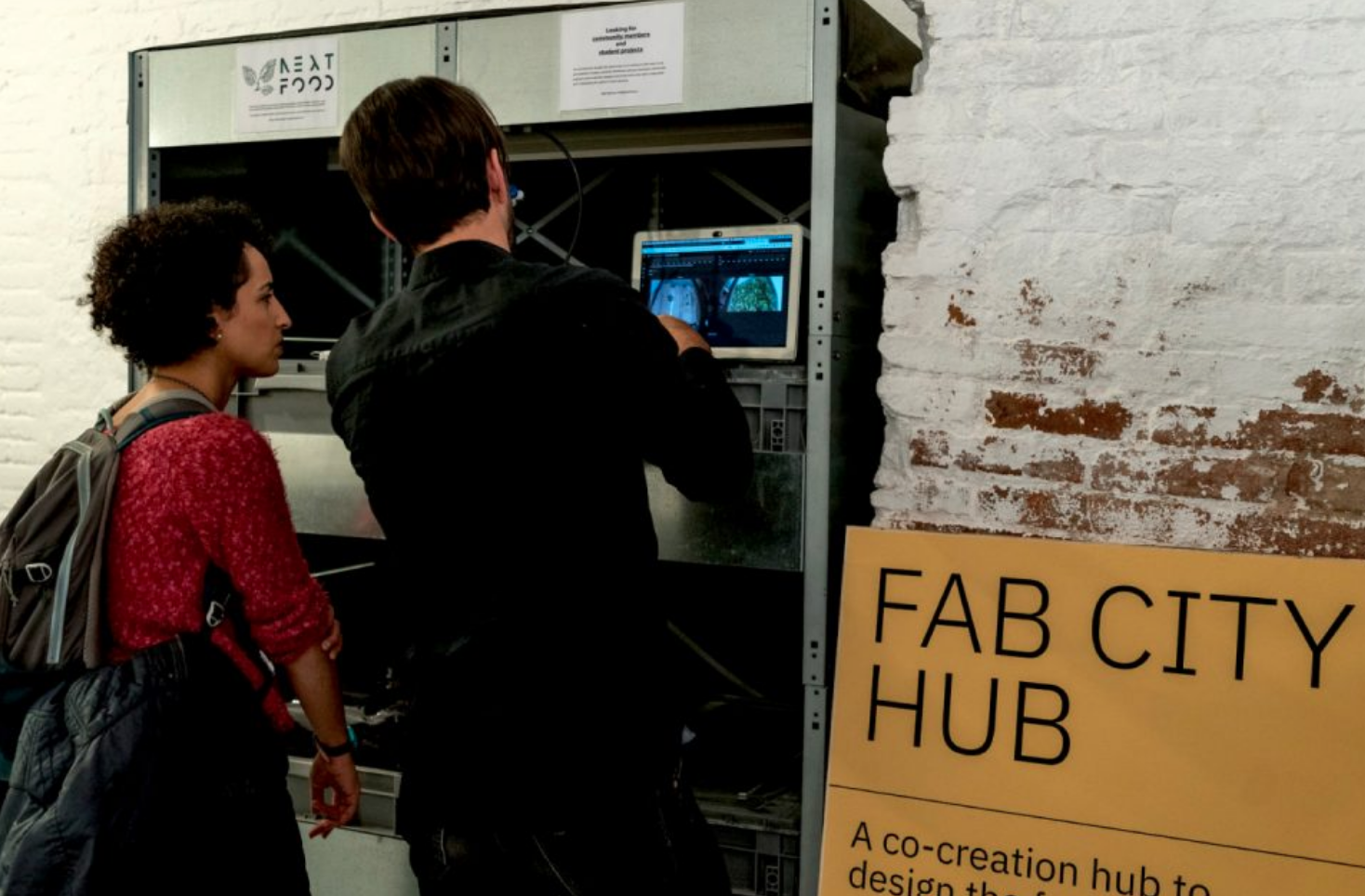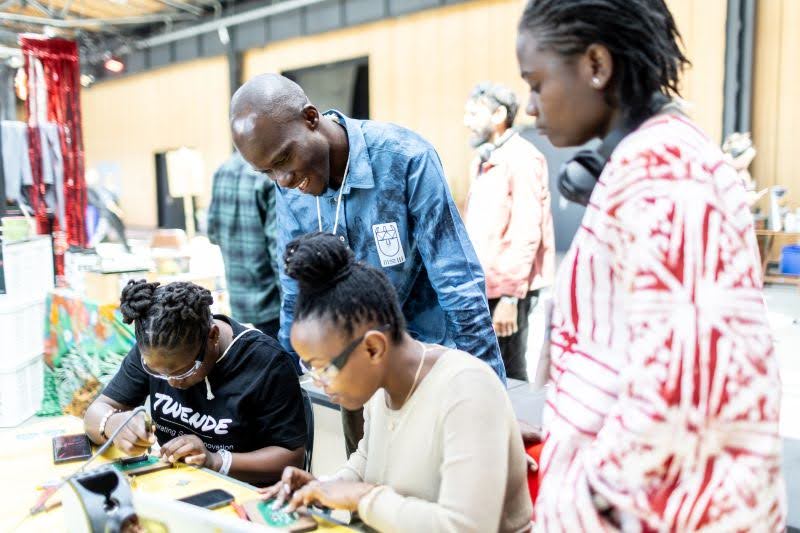Fab City: Activating meaningful design worldwide
- June 20, 2023
- 6 min read
How can cities be a part of making citizen-driven, self-sufficient futures possible? The Fab City Foundation is the stewarding body of the Global Initiative of Fab City which aims to shift the global production paradigm towards more meaningful approach to how we organise production and consumption in cities, to move away from complex global supply chains and towards regenerative futures driven by local knowledge and production capacity across various interconnected scales, from the local Fab Lab to the bioregion. A partner in the mAkE project, Fab City is sharing the approach to help scale digital innovation ecosystems across Europe and Africa.
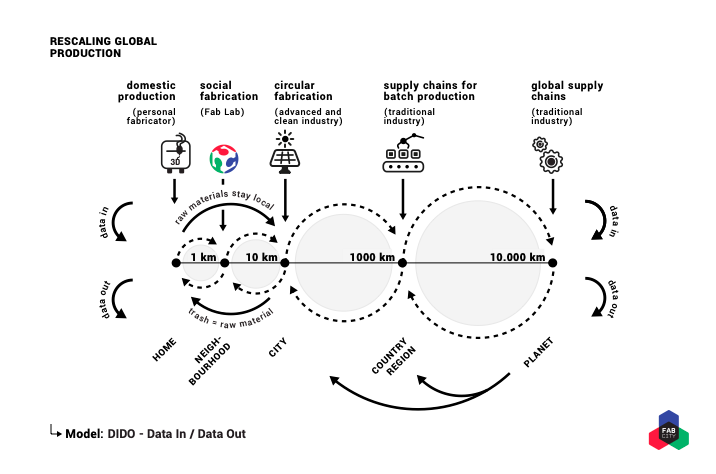
Relocalising global production using the DIDO – Data In/ Data Out model. Credit: Fab City Foundation
The Global Initiative comprises three arms: the Fab City Foundation, Fab City Collective and Fab City Network, which together form a global movement of citizens, government, experts and enthusiasts who work together to instigate this transformation.
Five aspects are key to the approach
1.Prototype the City
Cities are flexible playgrounds of ideas and initiatives. Built by and for humans they provide the opportunity for experimentation within a bioregional context.
2. Engage Real People
Fab City builds on a city’s heritage, aiming to engage existing initiatives in a narrative of productivity and regeneration. We connect local ecosystems with global networks.
3. Multiscale Thinking
We work at many scales to have maximum impact. Our approach rescales production using systems thinking from the domestic scale to the global scale.
4. Advocate, everywhere
Everyone everywhere can advocate for productive futures. Regenerating our planetary systems needs citizens to be policymakers. We empower everyone to make their voice heard.
5. Open Collaboration
Makers, entrepreneurs, academics, city officials, planners, and civic organisations. We promote open collaboration between stakeholders using a common approach to share and iterate.
Key Tools, Methods and Resources
Another key to the Fab City approach is to upskill people through novel methodologies, as well as develop and deploy useful resources to help cities and citizens join the global effort. Many of these focus on the role design plays in shifting the global paradigm. Here we have curated a selection of tools, methods and resources.
Full Stack
The Fab City Full Stack is a framework that helps cities and regions interpret the Fab City challenge and guides them to implement it in a multiscalar and ecosystemic approach. It assists cities in defining their own Strategic Action Plan that reflects their local community and bioregion.
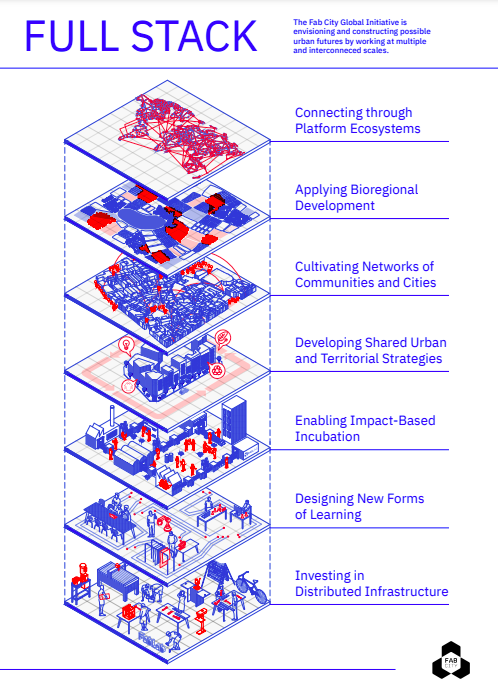
Fab City Full Stack. Credit: Fab City Foundation
More details on the Full Stack can be found here.
Open-sourcing a makerspace community
A case study including ‘how-tos’ and guides showing an approach to developing a workshop with makers and a makerspace community: from bringing in a qualified workshop instructor, mobilising local stakeholders, finding the resources for the workshop, organising the activities, or involving the media, to understanding and communicating the value that has been produced and how to replicate it — and scale it. Open, collaborative practices provide a jumpstart platform for everyone, so we do not have to reinvent the wheel. This resource tells the story of a Wind Turbine workshop at the newly opened Kopli 93 makerspace in Tallinn, Estonia. It aims to provide easily explained processes and activities supported by materials that inspire other emerging makerspace communities to understand themselves and take action.
View resource here.
Meaningful Design and embedded programs
Fab Island Challenge
The Fab Island Challenge is an experimental and sustainable approach to addressing local problems with local resources coupled with global knowledge to make meaningful interventions. The first iteration took place in the Island of Bali during the Bali Fab Fest 2022, as a unique collaboration format to accelerate the transition to a regenerative economy on the Island.
First iteration of the Fab City Challenge during the Bali Fab Fest 2022. Credit: Fab City Foundation.
Through the partnership with local initiatives, local on-ground issues around sustainability and life systems in Bali were identified and addressed. This was facilitated by rallying experts, enthusiasts, global leaders, and other practitioners of design making, digital fabrication, organising, and activism from 20+ countries to immerse themselves in the Bali local context as they ideated, designed, prototyped, and tested solutions collaboratively. Read more about the Fab Island Challenge in this impact report.
The Fab Bhutan Challenge will be hosted in Bhutan in 2023 as part of Fab Fest. This novel approach to meaningful design and development can be implemented anywhere in collaboration with the Fab City Foundation.
For more information on the Fab Bhutan Conference visit this link.
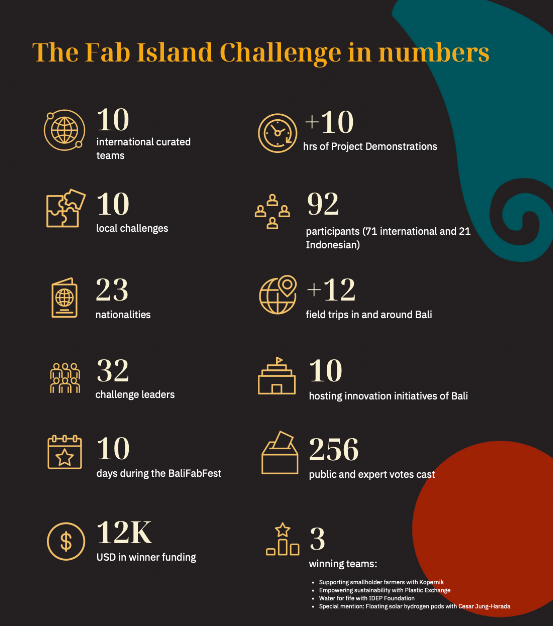
The Fab Island Challenge infographic. Credits: Fab City Foundation
Master in Distributed Design and Innovation
The Master in Design for Distributed Innovation (MDDI) is a distributed learning program focused on the intersection of design, technology, ecosystems, and communities to improve interspecies wellbeing. It connects a global community of changemakers with local innovators in order to address complex challenges.
Combining online and hands-on learning, it supports the development of the social and technical skills needed to develop projects for positive impact in local communities that aim for global transformational change. Fab City Foundation delivers the program in collaboration with the Institute of Advanced Architecture of Catalonia and a global faculty.
Meaningful Design
The work being done by Fab City, helmed by Fab City Foundation Executive Director Tomas Diez has led to new ways of thinking about the role of Design has in shifting global paradigm from the industrial one we are used to.
Spaces like Fab Labs, which are community-oriented, collaborative workshops equipped with digital fabrication tools, play a vital role in supporting the transition towards a Meaningful Design, a novel concept emerging adjacent to the Fab City movement. Fab Labs and digital innovation hubs provide an accessible and inclusive platform where individuals from diverse backgrounds can engage in hands-on experimentation, prototyping, and knowledge sharing.
These spaces foster creativity, interdisciplinary collaboration, and the exploration of alternative design methodologies that align with the principles of Meaningful Design: a more holistic and inclusive design approach that recognizes that human needs should not be the sole focus of design by embracing a broader perspective to encompass the well-being of other species, including animals plants, and fungi, as well as the harmonious integration of synthetic intelligence, such as artificial intelligence (AI).
Beyond this, Meaningful Design seeks to incorporate diverse cultural viewpoints, knowledge systems, and ways of understanding the world. The concept of Meaningful Design is currently being developed through the production of key literature and holds exciting potential for the mAkE community.
Authored by Kate Armstrong – Strategic Director, Fab City Foundation

